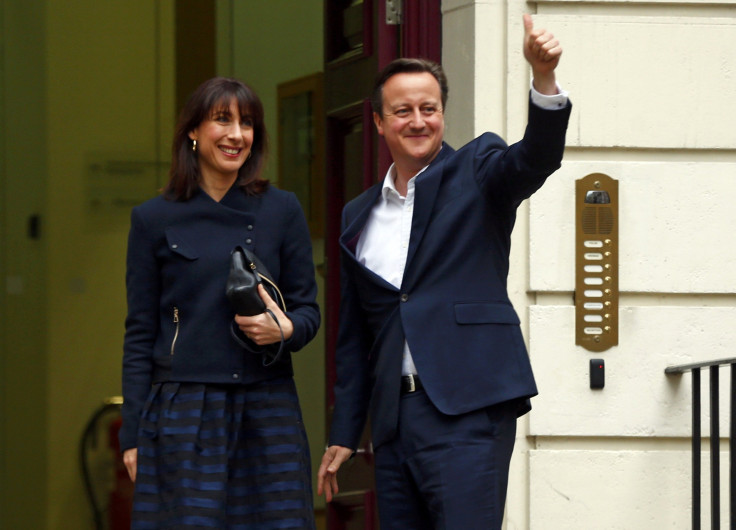UK Election Results 2015: Conservatives Head For 'Wafer-Thin' Majority; SNP Sweeps Labour Out

Update as of 5:01 a.m. EDT: David Cameron’s Conservative Party has won the U.K. elections in contrast to poll predictions, Reuters reported Friday. Markets reacted positively to the news, buoyed further by the possibility that the Tories would win with a clear majority and not have to rely on coalition government.
Cameron is now scheduled to meet with Queen Elizabeth by noon (7 a.m. EDT) to accept a formal mandate to govern.
Update as of 4:05 a.m. EDT: Latest figures show David Cameron’s Conservative Party heading toward a majority, with only 25 seats still left undeclared. The Tories have so far secured 310 seats while the Labour Party has won 228 seats.
“Any personal disappointment I have at this result is as nothing as compared to the sense of sorrow I have at the result Labour has achieved across the UK tonight in Scotland, as well as in England and in Wales, and the sense of concern I have about the future,” Labour shadow chancellor Ed Balls, who lost his seat to Tory candidate Andrea Jenkyns, reportedly said.
Update as of 2:20 a.m. EDT: With over 560 of the total 650 seats declared, David Cameron’s Conservative Party has secured 262 seats so far. The Labor Party, meanwhile, continues to trail behind with at 214 seats.
Here's to a brighter future for everyone. pic.twitter.com/EeN0YFAvBm
- David Cameron (@David_Cameron) May 8, 2015Only minutes after polling stations closed across the U.K. on Thursday night, an exit poll shocked British voters, analysts and politicians. Months of voter surveys had suggested the United Kingdom general election would be one of the closest in history, but the exit poll indicated something much different: a clear victory for sitting Prime Minister David Cameron and his Conservative Party, and a massive defeat for the Labour Party.
After five hours, with more than 130 of the 650 total seats declared, the projection appears to have been spot-on. The Conservative Party, expected to take around 278 seats, seemed likely to win 316 seats, just 10 short of a majority. Labour looked likely to lose as many as 17 seats.
The earliest effect of the projected Conservative victory was to drive up the value of the pound sterling.
More good Tory results are boosting the pound #GE2015 http://t.co/rEbpZqKtYS pic.twitter.com/kH31wmKJt3
- Charles Read (@EconCharlesRead) May 8, 2015
Perhaps the main cause of Labour’s downfall was the rise of the Scottish National Party (SNP). Scotland, which went through a wrenching referendum on independence last September, used to be a Labour stronghold. Now the SNP is projected to take all but one of Scotland’s 59 total seats in Westminster.
Labour’s disastrous showing probably means that party leader Ed Miliband will be out of a job in short order. Labour MP John Mann seemed to be hinting at that already.
Can't say that Labour leadership weren't warned repeatedly-those who even bothered to meet that is. Never hurts to listen.
— John Mann (@JohnMannMP) May 8, 2015
Nowhere was the political transformation of Scotland more evident than in Paisley & Renfrewshire South, a district in the suburbs of Glasgow. Longtime Labour MP for the constituency and (now former) Shadow Foreign Secretary Douglas Alexander lost his seat to 20-year-old SNP candidate Mhairi Black, who was just three years old when Alexander became Paisley & Renfrewshire South’s MP in 1997.
The Liberal Democrats were also decimated: They are projected to hold on to just 10 seats, a long fall from the 56 they won in 2010. For many voters, the Lib Dems betrayed their center-left roots by cozying up with the Tories to get into government.
Despite the Conservatives' shockingly strong performance, the party will probably not win an overall majority in parliament: Cameron and his colleagues will have to bring another party into a coalition to secure their government. It's theoretically possible that Miliband could persuade the Liberal Democrats to join with SNP to support a Labour government. But as election night came to an end in the UK, Cameron seems almost certain to remain in Downing Street.
For a full breakdown of election results, see BBC’s live tracker.
© Copyright IBTimes 2024. All rights reserved.





















